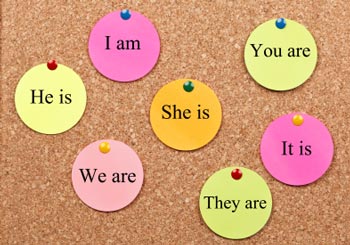 The rule is simple: singular subjects take singular verbs and plural subjects take plural verbs. But sometimes it’s difficult to tell whether a subject is singular or plural. That’s why subject and verb agreement errors crop up in so many pieces of writing. Making matters worse is the fact that most people don’t know what subject and verb agreement means. In fact, too many people don’t know a subject from a verb.
The rule is simple: singular subjects take singular verbs and plural subjects take plural verbs. But sometimes it’s difficult to tell whether a subject is singular or plural. That’s why subject and verb agreement errors crop up in so many pieces of writing. Making matters worse is the fact that most people don’t know what subject and verb agreement means. In fact, too many people don’t know a subject from a verb.When you’re fixing up your sentences and making sure they are correct, it helps to know the parts of speech, how to conjugate a verb, and how to diagram a sentence (so you can identify the subject). If you understand all those basic elements of language, then you can easily make sure your subjects and verbs agree.
Parts of Speech: Verbs
Verbs are action words: write, walk, run, dance, do, be, sit, listen, fidget, and contemplate are just a few verbs in the English language.
Conjugating Verbs
There are two types of verbs: regular verbs and irregular verbs. All verbs get conjugated based on the subject of the sentence, which is the thing or person doing the action. Here’s how the regular verb dance is conjugated:| Infinitive | dance | |
| Past | danced | |
| Present Participle | dancing | |
| Past Participle | danced | |
| Present | I | dance |
| You | dance | |
| He, She, It | dances | |
| We | dance | |
| You | dance | |
| They | dance |
All regular verbs follow this same template for conjugation. Past tense takes -ed, present participle takes -ing, and so on. However, irregular verbs are a little more challenging. Each one has its own unique conjugation system. Let’s take a look at the conjugation for the irregular verb write.
| Infinitive | (to) write | |
| Past | wrote | |
| Present Participle | writing | |
| Past Participle | written | |
| Present | I | write |
| You | write | |
| He, She, It | writes | |
| We | write | |
| You | write | |
| They | write |
Identifying the Subject of a Sentence
Every proper sentence must have a subject and a verb. The most basic example would be I write, which is a complete and correct sentence. As mentioned, the verb is the action word (write). The subject is the word that does the action (I). In the sentence I write, the subject is I because that’s who is doing the writing.Let’s get a little more elaborate. Take a look at the following sentence: I write poems.
If I is the subject (doing the action) and write is the verb (the action), then the word poems is the object, which is receiving the action.
Subject-Verb Agreement
As you can see with the section on conjugation, different verbs will be used in a sentence depending on the subject. You can say I write but you’re not supposed to say I writes or I writing. If you do, then your subject and verb do not agree. You can say She writes books, but you can’t say She write books or She writed books.We don’t see a lot of mistakes with basic subject-verb agreement. In fact, such mistakes are rare for native English speakers. Kids and people who are learning English often have trouble with subject-verb agreement. And these mistakes aren’t limited to English. I made plenty of errors with subject-verb agreement as a young adult learning French. It’s especially problematic when irregular verbs are involved.
Easy as it seems, there are common mistakes in subject-verb agreement. Which sentence below is correct?
1. Each of the students write a book.
2. Each of the students writes a book.
If you guessed sentence number two, you guessed correctly. The following subjects all use the singular verb form: each, everyone, everybody, nobody and someone.
What about compound subjects? Which sentence below is correct?
1. My niece and nephew dance.
2. My niece and nephew dances.
The correct sentence is number one. An easy way to remember this is to replace the subject with a pronoun. In this case, “niece and nephew” would be replaced with they: They dance.
The words either and neither present an interesting challenge. Only one of the following sentences is correct:
1. Either my sister or my brother write.
2. Neither my sister nor my brother writes.
Number two is correct. With either and neither, we use the singular form of the verb. Unless one of the subjects is plural:
1. Either my sister or her friends dance.
2. Neither my sister nor her friends dances.
In this special case, the subject closest to the verb drives whether the verb is singular or plural. Since “friends” is plural, we use the plural form of dance. In this case, we replace “friends” with they to get They dance. The correct sentence is number one.
Final Challenge
As you write, you will inevitably come across puzzling constructions involving subject-verb agreement. Here’s one last challenge for you to consider:1. The team had a meeting. They decided to extend the deadline.
2. The team had a meeting. It decided to extend the deadline.
3. The team members had a meeting. They decided to extend the deadline.
How many of these paragraphs are correct? Post your answer in comments
No comments:
Post a Comment